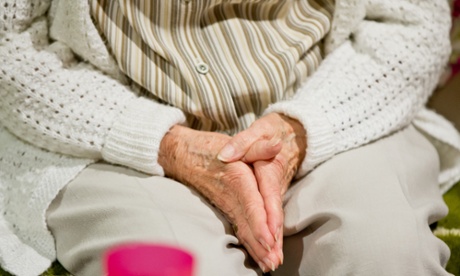Pictures taken by a little-known
photographer between the 1930s and 1960s have found a new use helping to trigger
memories and reminiscences among people with dementia.
When Joseph Hardman died in 1972, his wife donated almost 5,000 glass
negatives to the
Museum of Lakeland
Life and Industry in Kendal, Cumbria.
The stunning images document decades of daily life from all over the Lake
District - from antiquated farming techniques to beautiful landscapes.
And now they've been used to help a group of people living with dementia in
the region - taking their own versions of his images and using them as a
catalyst to reminisce about their lives.
Hardman moved to the area in 1911 and between the 1930s and 1960s he covered
up to 200 miles a week in a taxi canvassing the region and selling his photos to
local newspaper the Westmorland Gazette, according to the museum.
The idea behind the project was simply to follow Hardman's footsteps over a
five-week period, says Anne-Marie Quinn, who ran the sessions and works for
Lakeland Arts.
So just like Hardman himself, the group took taxis everywhere, indulged in the
tea and cakes he was fond of, and visited some of his favourite places.
One such place was Dora's Field in Rydal, made famous by the poet William
Wordsworth.
"That was also a trigger for Wordsworth's poetry, tapping into people's deep
long-term memory - a lot of this generation learnt that poetry by heart," says
Quinn.
As locals of the region, images of the landscapes particularly resonated with
them, she says.
Upon passing through busy traffic in Bowness, one person remarked to Quinn
how she'd always wanted to live by the lake. The memory preceded anecdotes about
how she had once cultivated a garden and could name all the different types of
trees.
"It just triggered really valuable conversation that gave you a sense of this
person, rather than this person with dementia," Quinn says. "That was really
powerful."
Continue reading the main story
Find out more
Improving dementia memory therapy, part of a week-long series by
Inside Out, was broadcast on
BBC One North East & Cumbria, Yorkshire & Lincolnshire, South West and
West on Monday 13 October. It will be available on the iPlayer for 30 days.
Joyce Grosvenor, who still lives independently,
spontaneously began writing in shorthand again - she hadn't used it for years.
Grosvenor didn't even realise she was doing it until Quinn saw her scribbling in
her diary. Grosvenor later used her rediscovered skill to design her own memory
map of their journey, including the words "wonderful" and "life-enhancing".
A 1953 photograph of Abbot Hall revealed an outdoor dancefloor in front,
where there is now an oval-shaped lawn. People used to celebrate on the
dancefloor during events such as VJ Day at the end of the war or the Queen's
coronation, explains Quinn.
"That led us to question what songs were being sung, tapping into a sense of
fun," she adds. Soon the group were singing a rendition of Some Enchanted
Evening, from the 1949 musical South Pacific.
"Every time we met there was singing - triggered by conversations about what
musicals were about at the time," Quinn recalls.
 Abbot Hall with its outside dancefloor
Abbot Hall with its outside dancefloor
 Joseph Hardman recorded the traditions of Lakeland
life
Joseph Hardman recorded the traditions of Lakeland
life
Reminiscence therapy is a burgeoning part of dementia care, says Martina Kane
of the
Alzheimer's
Society.
"[Many] deep-seated memories have a lot of emotion attached to them," she
says. "You can tap into someone's positive emotions of their past and that can
bring some positive emotion to them."
"In the dementia care world reminiscence is up there as one of the leading
groups of therapeutic approaches," explains Prof Bob Woods, an expert in the
clinical psychology of older people at Bangor University.
"Essentially it's a good way of facilitating communication, and so it helps
people to feel more socially integrated and comfortable," says Woods. This is
often as important for the carers as for those with dementia, he says, allowing
them to see the person beyond the disease.
Aside from emotions and familiarity, the nature of dementia often means it's
easier for people to recall older memories than quickly bringing to mind
day-to-day events, Kane adds.
And talking is typically less powerful than having something that people can
look at, pick up and feel, says Woods, even if the person doesn't necessarily
recognise exactly what it is. "It starts off a process of talking, sharing and
communicating."
Photographs are just one way to stimulate memories. Songs and poetry often
came out of conversations inspired by Hardman's photos, says Quinn.
 Anne-Marie Quinn (far left) says the landscapes
particularly resonated with local people
Anne-Marie Quinn (far left) says the landscapes
particularly resonated with local people
"Music can be a really powerful trigger," explains Kane. It's not uncommon
for talented musicians to continue playing long after other parts of their brain
have deteriorated, she adds.
Videos of events like the Moon landing can be equally powerful, Kane says.
Sometimes just a football or quilt is enough, she adds.
In the group's case, they used props appearing frequently in Hardman's
collection. "Using the parasol was always lovely," Quinn says, "it rooted them
in [time], like shining a little light on the past."
What is dementia?
- An umbrella term referring to a collection of symptoms, which may include
memory loss and difficulties with problem-solving or language
- Progressive condition caused by brain disease, currently without cure
- Alzheimer's disease affects 62% of those living with dementia
- About 800,000 people formally diagnosed with dementia in UK - but only 43%
with the condition get a diagnosis
- Approximately one in 20 people over age 65 have it, rising to one in six by
the age of 80. One in three in the UK will have it by the time they
die
Source:
Alzheimer's
society,
BBC
Science
Of course not all memories are happy ones.
The song If You Were the Only Girl in the World reminded Grosvenor of her
father singing it to her sister, explains Quinn. "That had quite a sad memory
because her sister died [young] and so it was very poignant."
It could be considered a gamble bringing up memories without any idea of what
may surface.
"But it's not necessarily a bad thing if a person becomes emotional in a
different way," says Kane. "It's important to let people tell their story [and]
making sure you acknowledge someone's feelings."
"One of the main advantages of reminiscence therapy is that it's really
person-centred, it can be very individualised - so it's going to depend on the
person and what their memories have been," she adds.
Kane says that although it's becoming more common to use this type of
therapy, it's more prevalent in social care settings than healthcare. "It's
still something we'd like to see an awful lot more of."
A US study last year found that songs from classic musicals - such as The
Sound of Music, The Wizard of Oz and Pinocchio -
helped
improve brain function in Alzheimer's patients.
And a Dutch dementia care "village" has experimented by having different
houses each designed to evoke various eras and styles.
A lot of it is about familiarity, says Woods. Many care settings in the UK
also have "down memory lane" sections, he says.
But for Quinn, the project was always about more than just reminiscence - she
was interested in the present and forging new memories as well.
"I was trying to [create] a project that would generate wonderful
experiences," she says.
"When dementia compromises your capacity to retrieve memory, people still
have an imaginary and emotional life and actually you can find out a huge amount
about a person by working with that."
"The point is to enable communication and a sense of identity in the
present," agrees Woods. The past forms part of everyone's present identity to
some extent, he adds.
And one coincidence ensured that the group witnessed the past and present
intertwine in less abstract form.
"One of the special little moments that none of us could plan for was that we
met - just by chance - one of Joseph Hardman's models, who [had] modelled in her
late teens in 1948-1949," Quinn says.
Delia Shaw featured in many of the photographs and ended up meeting the whole
group. She'd been an evacuee to the region and it also turned out that she'd
known fellow evacuee Annette Dunlop, a member of the group, decades earlier.
Quinn believes that the real benefits of the project were social. "The
connection between everybody, the friendships that people made - and the
laughter was just incredible."
"The company" was the best thing about the experience for Dunlop.
"It's been wonderful," agrees Grosvenor.



















